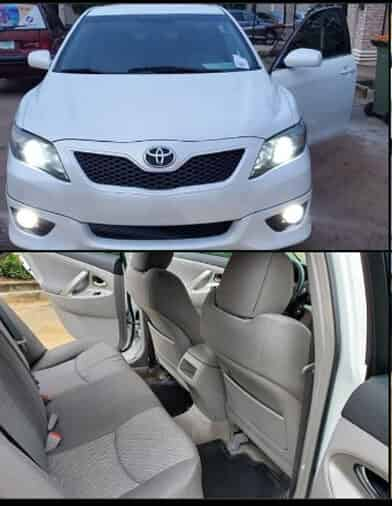

Common Issues with Toyota Camry: What to Know Before Buying
The Toyota brand has maintained its popularity in the automobile market, and this holds true in Nigeria as well. It’s hard to imagine a time when Toyota vehicles won’t be in demand in Nigeria. In 2021, Toyota achieved a significant milestone by surpassing Mercedes-Benz to become the Most Valuable Automobile Brand in the world, with an estimated brand value of approximately $59.5 billion, according to a report from Brand Finance Automotive Industry.
Toyota’s reputation is largely built on the reliability and dependability of their vehicles. Among their lineup, the Toyota Camry stands out as one of the top mid-size sedans known for its quality. In fact, a 2020 J.D. Power mid-size car award ranked the Toyota Camry in the 5th position, alongside the Honda Accord, with a Quality and Reliability Score of 82/100.
However, even with its high ratings, there are still common issues associated with the Toyota Camry. This article will shed light on these problems, particularly important for Nigerians who often opt for used cars due to budget constraints. Before you decide on a specific year model of the Toyota Camry, it’s essential to be aware of the most prevalent issues discussed in this article.
Common Issues with Toyota Camry
The following are some of the most frequently encountered problems with Toyota Camry, which will be explored in detail in the subsequent sections:
- Engine Problems
- Transmission Issues
- Problems with Interior Accessories
Engine Problems
Toyota places a strong emphasis on the reliability of their vehicles, and the Toyota Camry is no exception. Despite its reputation, the Camry still experiences certain engine-related issues, such as excessive oil consumption and oil burning. These problems are most prevalent in specific model years, including 2007, 2008, 2009, 2010, 2011, and 2012.
Excessive Oil Consumption: Among these model years, the 2007 Camry had the highest number of complaints related to excessive oil consumption, closely followed by the 2009 model. Owners of these models reported that the engine oil would run out after approximately 1,200 miles of usage.
Oil Burning: The 2007 models, in particular, were plagued by oil-burning issues, which experts attribute to defective piston rings. In addition to these problems, unintended acceleration while braking and speed control issues have also been reported by owners of Camrys from 2007 to 2020. Unintended acceleration refers to situations where the cars accelerate on their own even when the brake is pressed down, while slow or delayed acceleration occurs even when the accelerator is fully engaged.
If you are considering purchasing a Camry from these model years, you should be prepared for the possibility of encountering these issues. It is advisable to either avoid these model years or be well-informed about these problems before making a purchase.
Transmission Issues
Another area where Toyota Camry has faced complaints is related to the automatic transmission. Several owners have reported instances where the vehicle’s gear shifter shifted erratically on its own, without any input from the driver. Additionally, some Camry owners have experienced uncontrollable shaking while driving and unexpected surges in acceleration. Other transmission issues include slippage, the vehicle rolling even after being shifted into park, and an unexpected drop into a lower gear.
These transmission problems have been more commonly reported in Camry models from 2007 to 2018. When test-driving a Camry, it’s crucial to pay close attention to the transmission’s performance to avoid any potential issues in the future.
Interior Accessories Issues
For Camry models from 2006 to 2015, a common problem lies in the realm of interior accessories. The most prevalent issue is the melting and stickiness of the dashboard materials. Users of these Camry models have complained that the melting dashboard produces a shiny glare, making it challenging to see clearly while driving. Other interior accessories complaints include malfunctioning dashboard clusters, broken sun visors, and defective auto-door locks.
- Dashboard Cluster Malfunction: Issues related to malfunctioning dashboard clusters have been reported in the 2007 and 2008 models.
- Broken Sun Visor: Problems with broken sun visors have been noticed in Camry models produced from 2006 to 2011.
- Defective Auto-Door Locks: The issue of defective auto-door locks has been reported in Camry models from 2007 to 2009.
When inspecting a used Toyota Camry, be sure to examine these interior accessories issues. However, it’s advisable to consider avoiding these specific model years entirely if you want to prevent these problems.
Conclusion
In conclusion, while the Toyota Camry enjoys a reputation for reliability and quality, it is not immune to common issues that can affect its performance and user experience. Being aware of these problems can help you make an informed decision when purchasing a used Camry. Whether it’s engine problems, transmission issues, or interior accessory concerns, knowing what to look out for can save you from potential headaches down the road. So, before you seal the deal on a used Toyota Camry, ensure you’ve thoroughly inspected the car and are prepared to address any known issues.
Add a comment Cancel reply
Comments (0)
Categories
- Biography (4)
- Car Reviews (31)
- Car Tips (53)
- Classic Cars (45)
- Net Worth (12)
- Transportation (19)
Recent Posts
Related posts


Top 5 Reliable Car Dealerships in Lagos: Your Ultimate Guide

How to Buy a Tokunbo Car in Nigeria Without Getting Scammed








